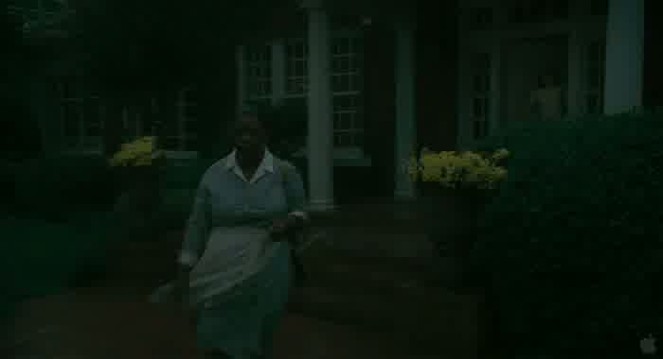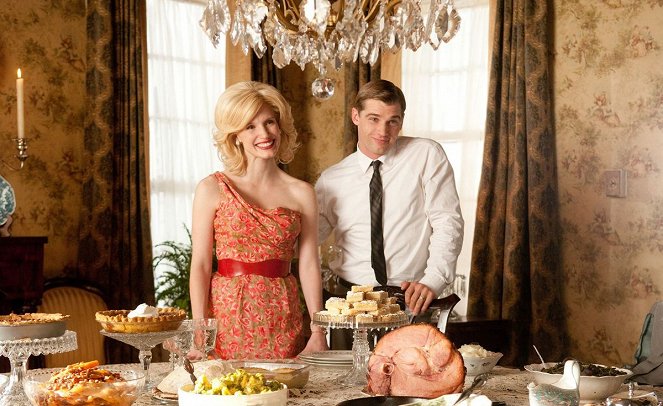Rendező:
Tate TaylorForgatókönyvíró:
Tate TaylorOperatőr:
Stephen GoldblattZeneszerző:
Thomas NewmanSzereplők:
Emma Stone, Viola Davis, Bryce Dallas Howard, Octavia Spencer, Jessica Chastain, Ahna O'Reilly, Allison Janney, Anna Camp, Christopher Lowell (több)Tartalmak(1)
Skeeter (Emma Stone) a főiskola befejezése után újságíróként próbál pénzt keresni, de elhatározza, könyvet ír az előkelő déli családoknál szolgáló cselédekről, méghozzá a szolgálók nézőpontjából. Hosszas rábeszélés után Aibileen (Viola Davis), Skeeter legjobb barátjának házvezetőnője, a hallgatást megtörve elsőként mesél a kívülállók számára zárt fekete közösség félelmeiről. Annak ellenére, hogy Skeeter életre szóló barátságait kockáztatja, Aibileennel közösen folytatják a kutatást, és hamarosan több nővel találkoznak, akik szeretnék elmesélni történetüket, és kiderül, sokkal több mondanivalójuk van, mint amire számítottak. (Fórum Hungary)
(több)Videók (57)
Recenziók (9)
Sajnálom, hogy nem tudunk ilyen szép filmeket készíteni a múltunkról. A tankönyvszerűen tökéletes hollywoodi filmkészítés sablonossága itt csupán eszköz egy különös történet elmeséléséhez, amelynek - különösen ma, amikor Barack ül az amerikai trónon - óriási súlya és történelmi értéke van. Tökéletesen kiválasztott, felöltözött és vezetett színészek - alapvetően minden karakter és színészi játék hab a tortán - anélkül, hogy szükség lenne sikoltozásra, drámaiságra és nyomasztásra. Vagy arra, hogy mint film nagy mélységre játsszon. A segítség alapvetően a sztori miatt mély. És lenyűgöző annak előadásával. Inkább csak "kötelességből" elmentem megnézni "azt az Oscar-díjas filmet, tele hisztérikus nőkkel és faji kérdésekkel, amelyek engem nem érdekelnek" - és az elmúlt egy év legkedvesebb filmes simogatást kaptam. Az egész moziterem majdnem sírt.
()
The Czech title is a diagnosis. Exactly: a black-and-white world, to the extent that if one wanted to nag, one could write something about political correctness shifting to inverted racism: white women are stupid, superficial, incapable of emotional and practical life. The black servants resemble a kind of super-ego - wise, kind, contemplative, parental, holding all the functions that their social "superiors" lack. It is also interesting in that those who are not "racists" in the film - aside from the main heroine - they are characters who are either enormously stupid (Celia) or sick (old Holbrooke), or absent (men, probably... some of them). Clearly, it is not the creative intent that Tate Taylor pursued godly goals, but as history teaches us - black-and-white worlds sometimes inadvertently subvert themselves, too much for clarity (see my favorite social realism). Black and white worlds also require a very conservative form, settled characters and a very limited ability to reflect on problems. This film does not reflect the essence of racism, but rather the simplified effort of the current "white" civilization to name old wrongs in a cultured way. There is no doubt that if this phenomenon were simplified to the level portrayed in Taylor's film, it would have been resolved long ago. But I take The Help as it is: at its core, a pleasant, cultivated tale of the battle between good and evil, surrounded by something from the grandeur of our grandmothers' wisdom and arthritic sentiment. Thanks to the episode with shit, the effort for a little rougher moments and a quite pleasant pace, I give it a star more than the whiny sentimental The Descendants. At their core, however, these are completely identical types of films. Designed for self-redeeming emotion and numb forgetfulness. A cultural symptom.
()
Kind in a black and white way and a little too obtrusive female drama that is occasionally ridiculously naive (there are three types of character; a cheerful black lady with a troubled past endowed with common sense, an affected xenophobic, upper-class white lady and men who we don’t see or, when we eventually do, then they invariably run away from their problems). It rides on the harmless, tearjerker wave, but never delves beneath the surface... We only take a look there in the opening scene and that is by far the best moment in the movie.
()
Yeah, this is the kind of politically correct, high-minded Oscar safe bet where pretty much all the black characters can be compared to the greatest philosophers in history thanks to their human (popular) wisdom, but I can’t help it, I really liked it. In its 146 minutes, it has charm, is entertaining, and has good performances, direction and script. It was nice, but at the Oscars I will root for someone else.
()
Despite the fact that Skeeter's story openly appeals to emotions through its narrative, soundtrack, and gradually revealed small details, I am surprised by how straightforward it actually is. There is no hiding of the main theme within various subplots, no treading water. From the first significant scene, it delivers a clear message at a higher speed and easily maintains it for over two hours. Thanks to this, the triple catharsis feels even more impactful. Perhaps if there had been a more definitive, slightly more fateful conclusion, I would have been completely satisfied. In that case, I felt that I could have handled an additional five minutes of voiceover in a slightly distant future during the end credits. Nevertheless, The Help has won me over not only with its storytelling power but also with its flawless casting, even in the smallest roles.
()



Hirdetés